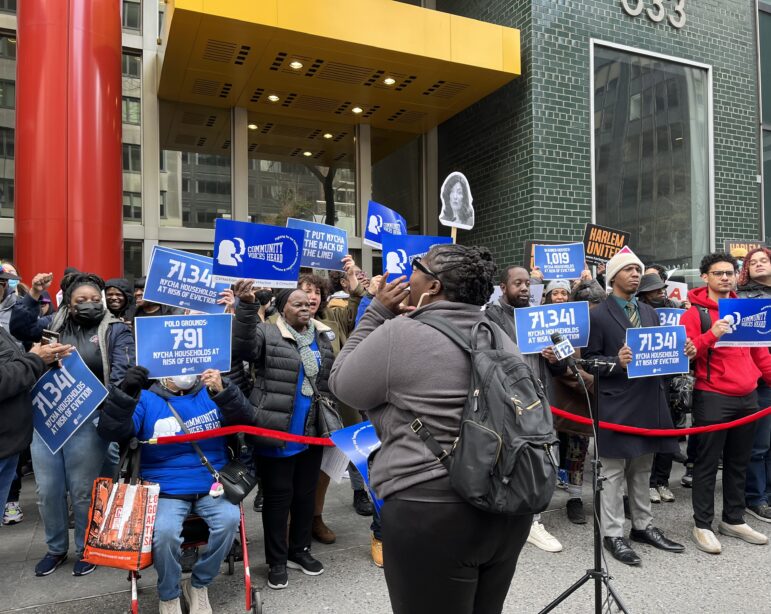
NYCHA Tenants Sue Over Early Exclusion From State Pandemic Rent Relief
The class action lawsuit, filed Tuesday on behalf of New York City public housing tenants left out of the state’s rental assistance program during the height of the pandemic, alleges the state’s distribution of the funds—for which these tenants received low priority—amounts to discrimination.
Tatyana Turner
NYCHA tenants and activists rallying for more state rent relief funds in 2023.
Attorneys at Fordham Law School filed a class action lawsuit Tuesday on behalf of New York City public housing tenants left out of the state’s rental assistance program during the height of the pandemic, alleging New York’s distribution of the funds—for which these tenants received low priority—amounted to discrimination.
The federal suit, brought by students at Fordham’s Housing and Urban Law Clinic, takes aim at the New York City Housing Authority (NYCHA) and New York State’s Office of Temporary and Disability Assistance (OTDA), the latter of which administered the state’s Emergency Rental Assistance Program (ERAP).
Launched at the height of the COVID-19 lockdown to aid tenants who fell behind on rent, ERAP initially prioritized its limited funds for landlords of market-rate apartments, effectively excluding public housing tenants. While the state provided $95 million in rent relief for NYCHA in last year’s budget, it was only enough to reach 15,000 of the roughly 70,000 public housing households that accumulated rent debt since the pandemic, the lawsuit states.
“We lobbied for this money because we were discriminated against even though we are taxpayers and we pay rent,” said Aixa Torres, the tenant association president at NYCHA’s Alfred E. Smith Houses and a member of Residents to Preserve Public Housing (RPPH). “Yes, we got some money, but did we really get our fair share?”
Torres’ group is among the plaintiffs named in the case, alongside three NYCHA tenants who’ve amassed rent arrears since 2020 but were “unable to benefit from ERAP during the height of the COVID-19 pandemic,” either because they didn’t know they were eligible and didn’t apply, or because their applications were left pending for years.
The suit also accuses NYCHA of failing to timely recertify tenants’ incomes—used to determine their monthly rent payments—to reflect the economic hardships they faced due to COVID-19, meaning they were paying more than they should have. Many residents who owe back rent now “live in fear of having eviction or consumer debt proceedings brought against them and their families,” the complaint states.
“We have a client who is seeking to file bankruptcy, we have a client who was diagnosed with cancer during this time. We have a client who lost her sister,” Professor Norrinda Brown, director of Fordham’s Housing and Urban Law Clinic, told City Limits Tuesday. “You’re going through all of the other stress and drama we were all experiencing during the pandemic and you think this program will help, but you’re just left pending for years.”
The complaint alleges discrimination based on race and national origin, since the vast majority of NYCHA tenants are Black and Hispanic or Latino, and accuses the defendants of violating the Fair Housing Act, the Civil Rights Act of 1964 and New York’s Human Rights Law, which prohibits source of income discrimination.
According to the complaint, the defendants’ “explicit deprioritization of public and subsidized housing tenants disproportionately prevented Black and Hispanic or Latino applicants from receiving… critical assistance due to their housing status and source of income, as compared to white applicants.”
“When we understand the demographics of subsidized people in New York City—which is well known public information and certainly understood—‘subsidized’ in the city is a proxy for deeply poor Black and Hispanic tenants. That’s who we’re talking about,” Brown told City Limits.
The lawsuit seeks an injunction to pause NYCHA from evicting and suing tenants over arrears whose ERAP applications were denied, left pending, or who didn’t know they could apply.
It comes as the Housing Authority struggles with declining rent revenue. At a City Council hearing in March, NYCHA Chief Executive Officer Lisa Bova-Hiatt said about 70,000 households owed back rent, amounting to $482 million as of Feb. 29. NYCHA carried out 58 evictions in 2023 and 50 so far this year as of March 7, she said.
Both NYCHA and OTDA told City Limits they do not comment on pending litigation.
To reach the reporter behind this story, contact Tatyana@citylimits.org. To reach the editor, contact Jeanmarie@citylimits.org
Want to republish this story? Find City Limits’ reprint policy here.
The post NYCHA Tenants Sue Over Early Exclusion From State Pandemic Rent Relief appeared first on City Limits.


